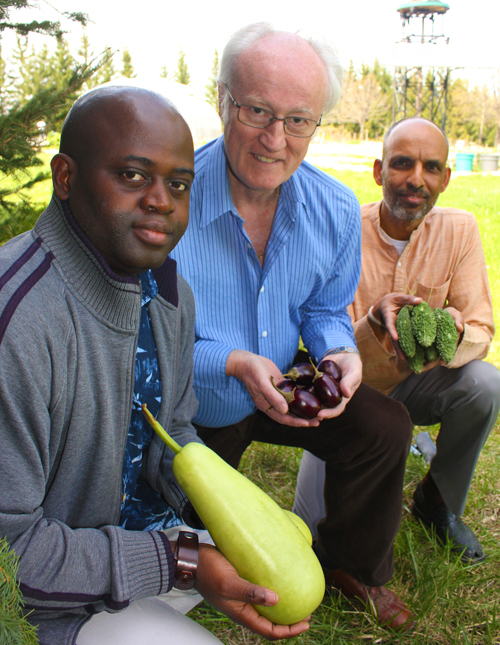Story by Johnny Roberts, a U of G student writer with SPARK (Students Promoting Awareness of Research Knowledge)

New Ontarians who crave their native country’s fruits and vegetables are frustrated by high-priced imports, or by problems that arise trying to grow the foods themselves. And University of Guelph researchers say Canadian farmers are missing a $60-million-a-month opportunity in the GTA alone by not growing these crops.
To help fill that gap, Guelph researchers are launching a program called Ethno-Cultural Vegetables Ontario (ECVO) that will create awareness about the benefits of locally produced ethnocultural vegetables and help farmers learn how to grow them.
“More and more people want to eat locally grown food,” says Prof. Glen Filson, School of Environmental Design and Rural Development. “We found that people are willing to pay more for these vegetables if they’re grown fresh and if they’re in an accessible location.”
Filson is working with ECVO project manager Bamidele Adekunle, a 2007 PhD graduate of the Department of Food, Agricultural and Resource Economics, and Sridharan Sethuratnam, a 2007 master’s graduate of Rural Extension Studies who manages start-up programs for the Guelph-based organization FarmStart. That incubator project helps new Ontario farmers – particularly immigrant and second-career farmers – gain access to affordable farmland.
To determine the market and demand for ethnocultural vegetables, the U of G research team implemented a questionnaire at ethnic grocery stores and food markets in the GTA. The team conducted more than 750 interviews targeting the most dominant ethnic groups and discovered ethnocultural foods were in high demand.
The researchers looked at reasons why particular ethnic groups consume a significant amount of vegetables. Respondents said the foods were healthy, nutritious, medicinal, part of their tradition or culture, offered a preferred taste, or were part of their vegetarian lifestyle.
The largest ethnic groups in the GTA were identified as the South Asian, Chinese and Afro-Caribbean communities. According to Adekunle and Filson, South Asian preferences often include okra, eggplant and bitter melon. The vegetables in high demand by Chinese were bok choy, Chinese broccoli and eggplant. The Afro-Caribbean group preferred okra, African eggplant, garden eggs and smooth amaranth.
The researchers estimate the demand per month for these ethnocultural vegetables is at least $21 million for the Chinese group, $7 million for Afro-Caribbeans and $33 million for South Asians. Filson says these numbers point to a significant niche market and that Canadian farmers should consider trying to grow some of these commodities.
“Money put into this potential market could also provide support during Canada’s economic repair and regeneration,” he says.
Some efforts are indeed underway to grow these vegetables in Canada. FarmStart, U of G’s Simcoe Research Station and the Vineland Research and Innovation Centre are attempting to grow these vegetables. They’re trying to determine important growing information such as crop spacing, the amount of fertilizer required and the kind of irrigation systems needed.
Ontario’s growing season isn’t as long as many of the native climates these vegetables are accustomed to, but some of these foods can be grown in greenhouses, or started there and finished in fields. And in many cases, local soil composition can be modified in the field to meet the demands that the particular crop requires, says Filson.
Funding for this knowledge translation and transfer initiative is provided by the Ontario Market Investment Fund and the Ontario Ministry of Agriculture, Food and Rural Affairs.